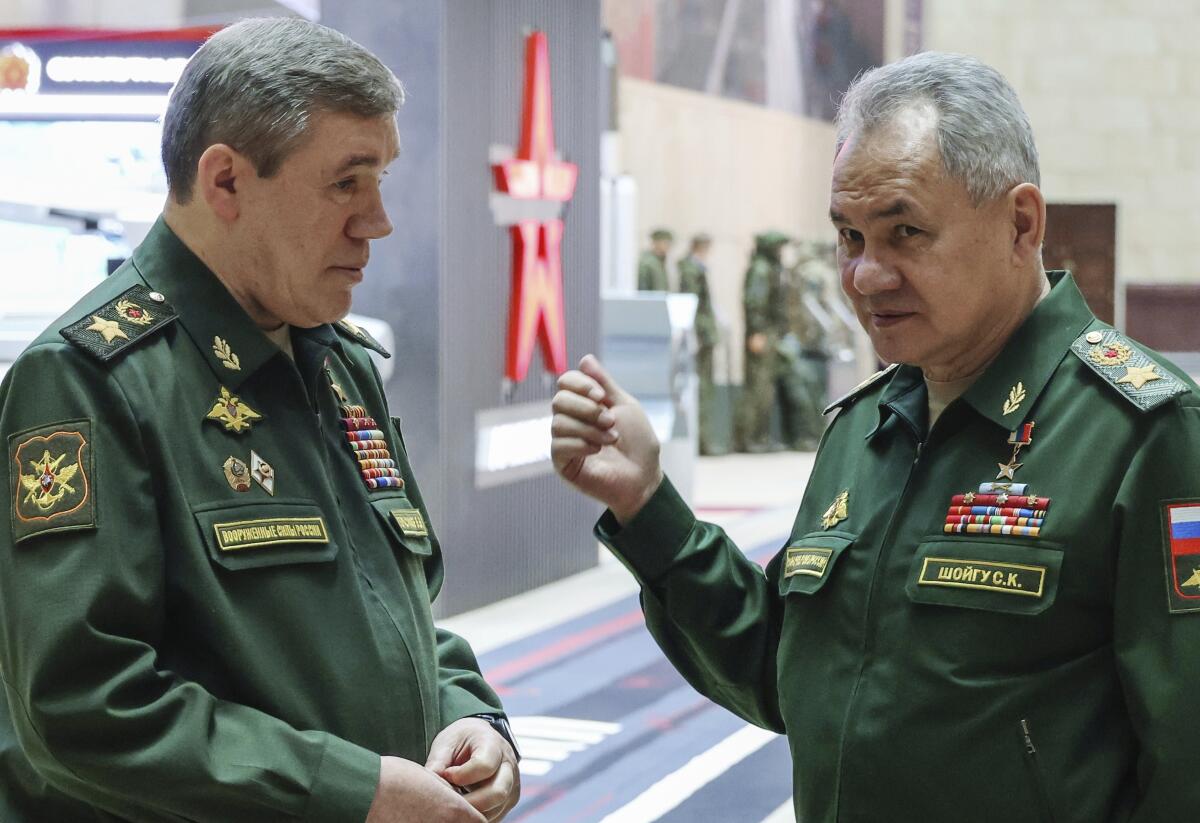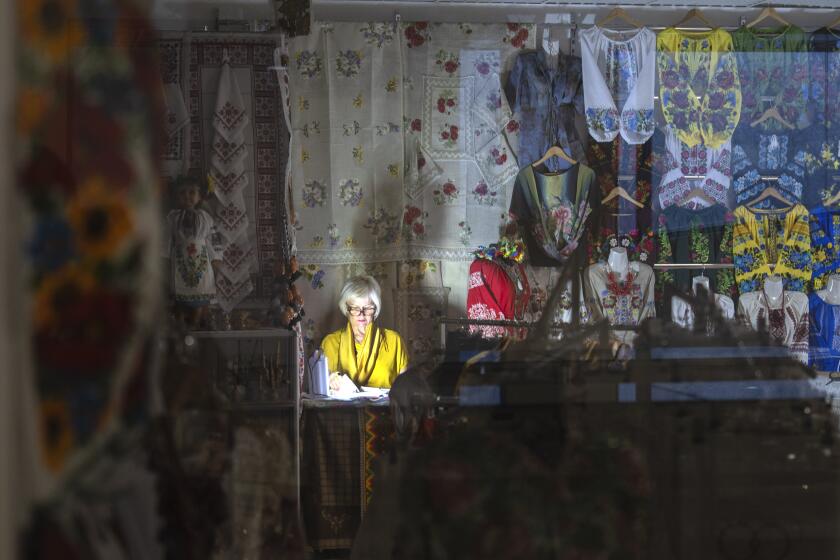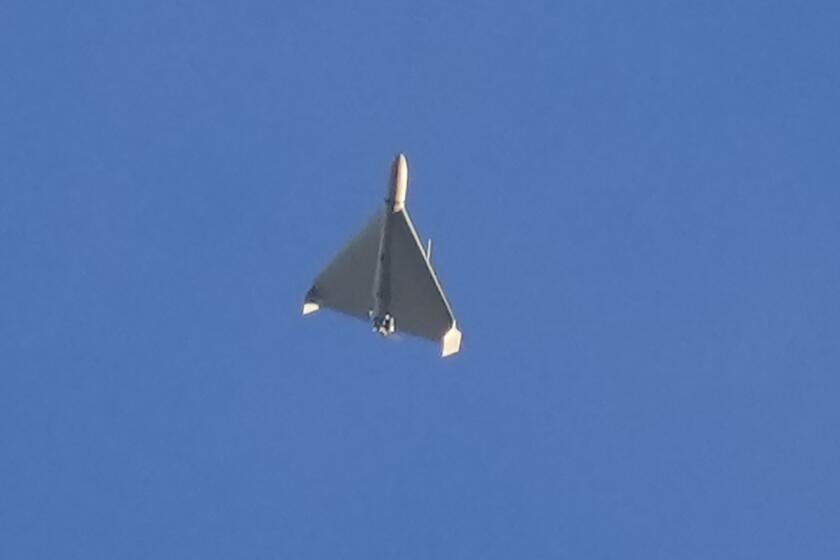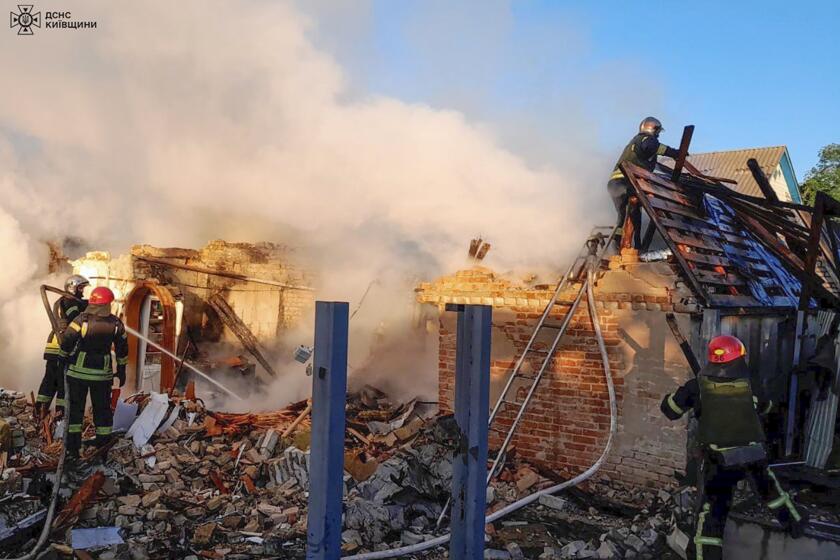International court seeks arrest of Russian officials over attacks on Ukrainian power plants

THE HAGUE, Netherlands ‚ÄĒ The International Criminal Court said Tuesday it issued arrest warrants for Russia‚Äôs former defense minister and its military chief of staff for attacks on Ukraine‚Äôs power plants, the third time the global court has accused senior Russian leaders of war crimes.
There is no immediate likelihood of either former Defense Minister Sergei Shoigu or chief of staff Gen. Valery Gerasimov being detained to face charges of war crimes and the crime against humanity of inhumane acts. Russia isn’t a member of the court, doesn’t recognize its jurisdiction and refuses to hand over suspects.
Still, the move heaps more moral condemnation on Russia’s invasion of Ukraine in February 2022.
The warrant is the global court’s latest effort to intervene in a major conflict. Earlier this year, the court’s chief prosecutor requested arrest warrants for Israeli Prime Minister Benjamin Netanyahu, his defense minister and three leaders of the Hamas militant group over the militants’ deadly attacks in southern Israel and the ensuing war in Gaza.
Last year, the court issued a warrant for Russian President Vladimir Putin, accusing him of personal responsibility for the abductions of children from Ukraine. That has occasionally complicated his travel though the practical implications have been limited.
Russia resumes aerial attacks on Ukraine’s power grid as Kyiv’s forces again target Russian oil storage depots with cross-border drone strikes.
Russia‚Äôs Security Council dismissed the arrest warrants as ‚Äúnull and void‚ÄĚ on Tuesday.
‚ÄúThat is empty talk, considering that the ICC‚Äôs jurisdiction does not include Russia and the decision has been made as part of the West‚Äôs hybrid warfare against our country,‚ÄĚ it said in a statement carried by Russian news agencies.
The court said in a statement that warrants were issued Monday because judges considered there to be reasonable grounds to believe that Shoigu and Gerasimov are responsible for ‚Äúmissile strikes carried out by the Russian armed forces against the Ukrainian electric infrastructure ‚ÄĚ from Oct. 10, 2022, until at least March 9, 2023.
Judges who approved the prosecutors‚Äô request for warrants said the suspects are charged with inhumane acts because there is evidence they ‚Äúintentionally caused great suffering or serious injury to body or to mental or physical health‚ÄĚ of civilians in Ukraine.
Under the leadership of Shoigu and Gerasimov, the Russian military has launched waves of missile and drone strikes that have killed thousands and damaged the country’s energy system and other vital infrastructure.
At least three people were killed in Kharkiv, Ukraine’s second-largest city, in Russian shelling Saturday afternoon.
Moscow has insisted that it only has targeted military facilities despite daily casualties in civilian areas. The court alleged missile attacks covered in the warrant targeted civilian installations.
It added that in the case of any installations that could have been considered military targets ‚Äúthe expected incidental civilian harm and damage would have been clearly excessive to the anticipated military advantage.‚ÄĚ
Ukrainian President Volodymyr Zelensky welcomed the warrants in a post on social platform X, saying both men are accused of ‚Äúheinous crimes against civilians in Ukraine during Russia‚Äôs reckless bombing of Ukrainian critical civilian infrastructure. These barbaric missile and drone strikes continue to kill people and inflict damage across Ukraine.‚ÄĚ
He added: ‚ÄúEvery criminal involved in the planning and execution of these strikes must know that justice will be served. And we do hope to see them behind bars.‚ÄĚ
Details of the warrants were kept under seal to protect witnesses, the court said.
ICC Prosecutor Karim Khan said in a statement that the decision to issue warrants ‚Äúreflects my office‚Äôs continued commitment to give meaningful effect to the protection that the law provides to civilians and protected objects.‚ÄĚ
Khan said his prosecution office ‚Äúremains focused in pursuing multiple, interconnected lines of investigation in Ukraine.‚ÄĚ
Ukraine’s president says Russia launched a massive nighttime attack on energy facilities in Ukraine, targeting seven regions with missiles and drones.
Putin removed Shoigu as defense minister in a Cabinet shakeup in May as he began his fifth term as president.
Shoigu, 69, has been widely seen as a key figure in Putin’s decision to invade Ukraine. Russia had expected the operation to quickly overwhelm Ukraine’s much smaller and less-equipped army.
Instead, the conflict galvanized Ukraine to mount an intense defense, dealing the Russian army humiliating blows, including the retreat from an attempt to take the capital, Kyiv, and a counteroffensive that drove Moscow’s forces out of the northeastern region of Kharkiv and from around Kherson in the south in the fall of 2022.
Shoigu, who had personal ties with Putin, got a soft landing with the high-profile post of secretary of Russia’s Security Council. At the same time, Shoigu’s entourage faced purges. A longtime associate and deputy, Timur Ivanov, and several other senior military officers were arrested on corruption charges, and other senior Defense Ministry officials lost their jobs.
Gerasimov, the chief of the General Staff since 2012, has so far kept his job. The 68-year-old career military officer has directly overseen Russian military operations in Ukraine.
In addition to the warrant against Putin, the court issued arrest warrants in March for two high-ranking Russian military officers on charges linked to attacks on civilian infrastructure in Ukraine that judges said happened ‚Äúpursuant to a state policy.‚ÄĚ
Last year, Russia announced indictments in absentia for a judge and prosecutor at the International Criminal Court who issued a warrant against Putin.
Corder writes for the Associated Press.
More to Read
Sign up for Essential California
The most important California stories and recommendations in your inbox every morning.
You may occasionally receive promotional content from the Los Angeles Times.












